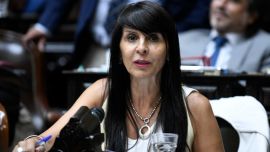The experts don’t sound optimistic. “In the best of cases, the year to come will be like this one,” said economist Juan Carlos de Pablo at the end of 2022, making it clear that high inflation will continue on into 2023 and that Argentina’s economy will not grow much.
With his characteristic powers of synthesis, De Pablo summed up the thinking of other private economists who consider the 2023 Budget projection of 60 percent annual inflation to be “fiddled” even if there is more agreement with its economic growth projection of two percent, owing to the “statistical lag effect” of last year’s five percent growth.
We already know that 2023 is off to a bad start. The extensive drought affecting much of the country has already halved the wheat harvest to 11.5 million tons, according to the Rosario Grain Exchange, while delaying the sowing of maize and soy.
IERAL, the economic think tank of the Fundación Mediterránea, has warned that farm exports “would be lucky” to limit their losses to US$1.6 billion. Nevertheless, “the most probable scenario” would see exports reaching a value of US$36.4 billion “for a fall of US$6.6 billion from the previous cycle” while the most pessimistic forecasts take the losses up to US$10.4 billion.
Austerity ahead
With this slump in revenues, the Economy Ministry has to carry out austerity in an election year, trimming the fiscal deficit from 2.5 to 1.9 percent of gross domestic product while paying all the debt it faces.
Only in the first half of this year, payments on national debt totalling US$72.684 billion will fall due, of which 79 percent correspond to different types of peso bonds, according to the report presented by the Congress Budget Office (OPC in its Spanish acronym). Just over US$11.5 billion corresponds to the loan from the International Monetary Fund (IMF) with a further US$1.5 billion from other multilateral financial institutions.
On this front the economist Aldo Abram assures: “These organisms have all the good will in the world to help this government as long as they don’t screw everything up with massive blunders. They will forgive anything and do whatever it takes so that the agreement does not fall through, there is no default and the responsibility is handed over to the next government.”
Speaking to Radio RealPolitik, Abram nevertheless warned: “The level of inflation will continue to be high” owing to the intense printing of money to meet the payments on the debt and the fiscal deficit so that inflation “will again reach 90 percent.”
Confirming commitments
Nevertheless, Massa is promising to meet his commitments to the IMF, including austerity, over and above the political demands of an electoral year.
Last November primary spending fell off 27.7 percent as against the same month of 2021, according to an OPC report, due to cuts in the subsidies for energy, water and the Correo Argentino post office, as well as reduced funding for pensions and provincial hospitals, less Treasury assistance to the provinces (ATN, in its Spanish acronym), the interruption of highway construction and the purchase of computers for the Conectar Igualdad scheme, along with vaccines against Covid-19, cutbacks in capital transfers to trust funds, state companies, the provinces and the Aerolíneas Argentinas state airline, etc.
In this framework the EyC (Economía y Sociedad) consultancy firm recalled: “Economic output last peaked in 2017 when there were 44 million inhabitants”. The official growth projections of a maximum five percent last year and two percent this year “indicate that we will be returning to that level in 2023 but now with 46 million inhabitants, implying that per capita income has still not recouped its losses, the more so since, taking into account the demographic factor, per capita income did not peak in 2017 but in 2011, since when the Argentine economy has shown an erratic growth performance.”
EyC thus forecast: “The GDP of 2023 will be similar to 2017 but five percent less in per capita terms and 11 percent below the 2011 peak.”
related news
by Fabián Quintá, Perfil



















Comments